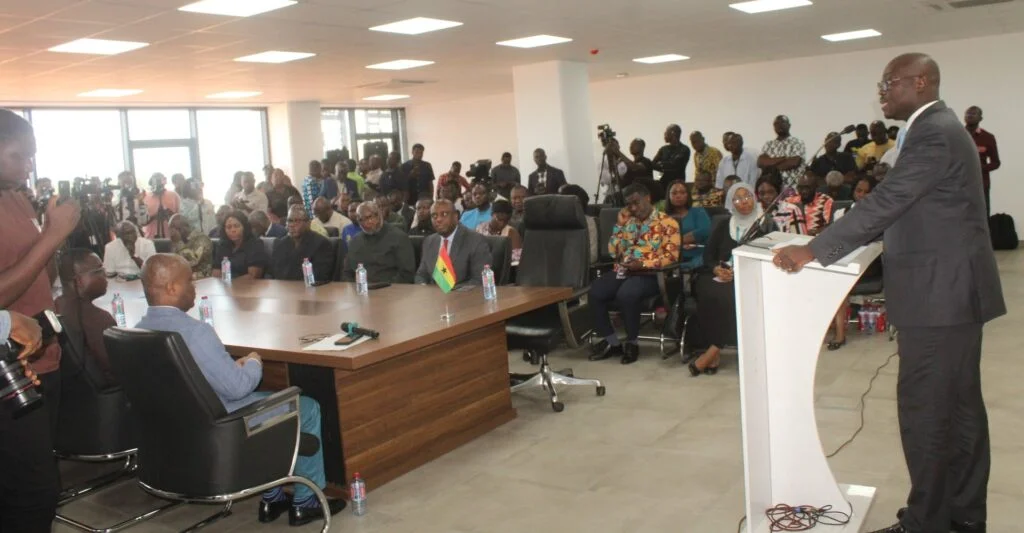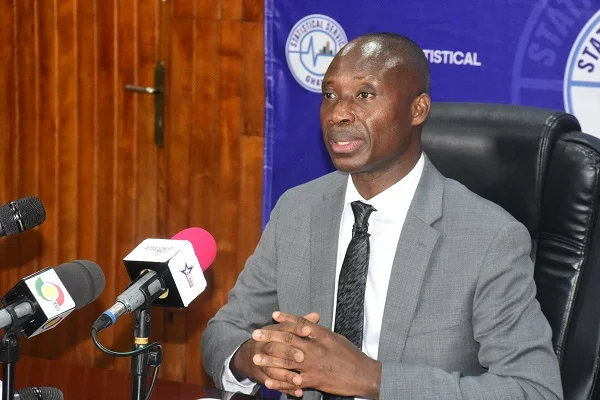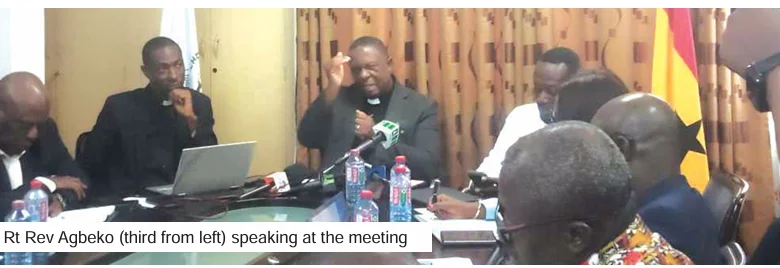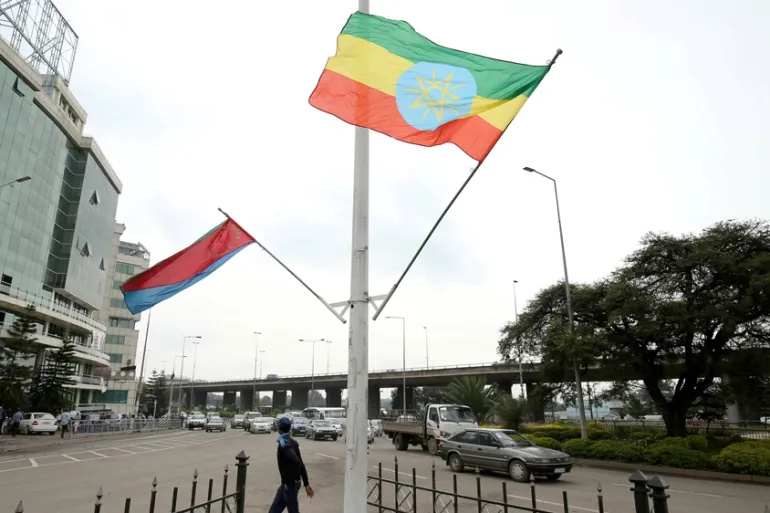 timer
timer
radio AKWANHWEFO BRENIE
schedule UP NEXT: 7:01 - 8:59
Announcements
View All





Global Ghana News
View AllKIM JONG UN CHOOSES TEEN DAUGHTER Kim Ju Ae - who is believed to be 13 - has in recent months been pictured beside her father in high-profile events like a visit to Beijing in September, her first known trip abroad. North Korean leader Kim Jong Un has selected his daughter as his heir, South Korea's spy agency told lawmakers on Thursday. The National Intelligence Service (NIS) said it took a "range of circumstances" into account including her increasingly prominent public presence at official events" in making this assessment. The NIS also said it would keep close tabs on whether she will attend the North's party congress later this month - its largest political event that is held once every five years. The party Congress is where Pyongyang is expected to give more details about priorities like foreign policy, war planning and nuclear ambitions for the next five years. On Thursday lawmaker Lee Seong-kwen told reporters that Ju Ae, who was previously described by the NIS as being "trained" to be a successor, was now at the stage of "successor designation". "As Kim Ju Ae has shown her presence at various events, including the founding anniversary of the Korean People's Army and her visit to the Kumsusan Palace of the Sun, and signs have been detected of her voicing her opinion on certain state policies, the NIS believes she has now entered the stage of being designated as successor," Lee said. Ju Ae is the only known child of Kim Jong Un and his wife, Ri Sol Ju. The NIS believes Kim Jong Un has an older son, but this son has never been acknowledged nor shown on North Korean media. News of Ju Ae's existence first emerged through an unlikely source: the American basketball player Dennis Rodman, who revealed to The Guardian newspaper back in 2013 that he "held baby Ju Ae" during a trip to the secretive state. Ju Ae made her first appearance on state television in 2022. She was shown inspecting North Korea's latest intercontinental ballistic missile while holding her father's hand. She has since made frequent appearances on state media, softening her father's image of a ruthless dictator. She accompanied him to Beijing for China's largest-ever military parade, where she was seen stepping off his armoured train at Beijing Railway Station. She is often seen wearing her hair long, which is forbidden for her peers, and wearing designer clothes, which are out of reach for most in her country. Another lawmaker, Park Sun-won said the role Ju Ae had taken on during public events indicated that she has started to provide policy input and is being treated as the de facto second-highest leader. The North Korean power had passed down the three generations of the Kim family, and it is widely believed that Kim Jong Un will pass on the throne to Ju Ae. In recent months, she was shown standing taller than her father, walking beside him, rather than following him. In North Korea, where photos published by the state media are believed to carry a great symbolic weight, it is rare for individuals other than Kim Jong Un to be positioned equally prominently in the frame. Although the South Korean spy agency now believes Ju Ae is the designated heir, it still raises questions. It is puzzling why Ju Ae, a daughter, would be selected as the heir above an older son in North Korea's deeply patriarchal society. Many defectors and analysts had previously dismissed the idea of a woman leading North Korea as an unlikely scenario, referring to the country's entrenched traditional gender roles. But Kim Jong Un's sister - Kim Yo Jong - does offer a precedent for female authority in the regime. Kim Yo Jong currently holds a senior position in the Central Committee of the Workers' Party of Korea, and is reported to have influence over her brother. However, it is also a mystery why Kim Jong Un, who is still young and appears relatively healthy, is already designating a 13-year-old child as his heir now. It is unclear what changes Ju Ae's succession may bring to North Korea. Many North Koreans hoped that Kim Jong Un, a Western-educated young man, would open their country up to the outside when he succeeded his father. Yet such hope was unfulfilled. Whatever plans this teenager may have for her country, she would likely have the singular power to shape it however she likes. 14th February,2026
SUICIDE BOMBING AT A SHIITE MOSQUE ISLAMABAD — A suicide bomber targeted a Shiite mosque on the outskirts of Islamabad during Friday prayers, killing 31 people and wounding at least 169 others, officials said, a rare bombing in Pakistan's capital as its Western-allied government struggles to rein in a surge in militant attacks across the country. Television footage and social media images showed police and residents transporting the wounded to nearby hospitals. Some of the wounded in the attack on the sprawling mosque of Khadija Al-Kubra were reported to be in critical condition. Rescuers and witnesses described a harrowing scene, with bodies and wounded lying on the mosque's carpeted floor. Hussain Shah said he was praying in the mosque courtyard when he heard a sudden, loud explosion. "I immediately thought that some big attack had happened," he said. He then went into the mosque to utter chaos — many of the wounded were screaming and crying out for help. Shah said he counted around 30 bodies inside the mosque, while the number of the wounded appeared to be significantly higher. No one immediately claimed responsibility for the explosion, but suspicion is likely to fall on militants such as the Pakistani Taliban or the Islamic State group, which has been blamed for previous attacks on Shiite worshippers, a minority in the country. Militant groups across Pakistan often target security forces and civilians. Though attacks are not so frequent in Islamabad, Pakistan has seen a surge in militant violence in recent months, largely blamed on Baloch separatist groups and the Pakistani Taliban, known as Tehrik-e-Taliban Pakistan, or TTP, which is a separate group, but allied with Afghanistan's Taliban. A regional affiliate of the Islamic State group has also been active in the country. In the initial aftermath of the explosion, a lower number of casualties was released, but Islamabad Deputy Commissioner Irfan Memon gave the latest tolls. Pakistan's Defense Minister Khawaja Mohammad Asif wrote on X that preliminary findings suggest the suicide bomber had been on the move to and from Afghanistan. Asif said the mosque's security guards tried to intercept the suspect, who opened fire at them and then detonated his explosives among the worshippers. The condition of the guards was not immediately known. Pakistan often accuses Afghanistan, where the Taliban seized power again in August 2021 as American and NATO troops were withdrawing after a 20-year war, of harboring militants and members of the Pakistani Taliban. Kabul denies the accusation. Afghanistan's Ministry of Foreign Affairs issued a statement Friday saying that the "Islamic Republic of Afghanistan condemns such attacks that violate the sanctity of sacred rituals and mosques and target worshippers and innocent people." The attack also drew condemnation from the international community, including the United Sates and European Union. Condolences and condemnation also poured in from various embassies in Islamabad. President Asif Ali Zardari and Prime Minister Shehbaz Sharif extended condolences to the families of the victims in sperate statements and asked that all possible medical assistance be provided for those wounded. "Targeting innocent civilians is a crime against humanity," Zardari said. "The nation stands with the affected families in this difficult time." "Those who are responsible must be identified and punished," Sharif said. Pakistan's Interior Minister Mohsin Naqvi also condemned the attack. Friday's attack occurred as Uzbekistan President Shavkat Mirziyoyev, who is on an official two-day visit, was attending an event with Sharif. The event in Islamabad was several miles away from the site of the explosion. A top Shiite leader, Raja Nasir, expressed deep sorrow over the attack at Khadija Al-Kubra. "Such a terrorist act in the federal capital is not only a serious failure in protecting human lives but also raises significant questions about the performance of the authorities and law enforcement agencies," he said and asked for people to give blood as the hospitals in Islamabad were in urgent need for blood supplies for the wounded. The last deadliest attack in Islamabad was in 2008, when a suicide bombing targeted the Marriott Hotel in the capital, killing 63 people and wounding over 250 others. In November, a suicide bomber had struck outside a court in Islamabad, killing 12 people. The latest attack came nearly a week after the outlawed Baloch Liberation Army carried out multiple attacks in insurgency-hit southwestern Balochistan province, killing about 50 people. Security forces responding to those attacks also killed more than 200 "terrorists," according to the military. 8th February,2026
U.S., IRAN TO HOLD NUCLEAR PROGRAM TALKS The United States and Iran are set to have high-stakes talks in Oman today to negotiate Iran's nuclear program. Typically, if both sides in a negotiation can't reach a deal, the diplomats go home, regroup and decide whether to hold another round of talks. But NPR's Greg Myre tells Up First that the U.S. has spent a month moving Navy ships and warplanes to the region, and if a deal isn't reached this time, President Trump could launch an attack on Iran. concessions during the negotiations, says Myre. The country has endured several setbacks over the last two years, including the U.S. and Israeli bombing campaign against its nuclear facilities last June. Myre says a limited nuclear agreement from Iran will probably not be enough for Trump. The U.S. wants to discuss broader issues, including limits on Iran's ballistic missiles. The U.S. also seeks to stop Iran from supporting militant proxy groups like Hamas and Hezbollah. Democrats released a 10-point plan for the Department of Homeland Security's immigration law enforcement agents in a letter to the GOP. In addition to their original demands, which include removing officers' masks, Democrats want officers to wear identifying information, such as their last name. Lawmakers also want these officers to have standard uniforms and equipment, aligning them with civil enforcement officers. 8th February,2026
JAPAN'S POLITICS SHIFT TO THE RIGHT Polls show Japan's first female prime minister and her coalition within reach of a decisive win in snap elections on Sunday. Sanae Takaichi got an additional boost in the form of an endorsement from President Trump, which appears to be the first time a U.S. president has backed a Japanese leader in an election. "While Trump is often an outlier," noted a Kyodo News Agency report, "it is very rare for the leader of any country to back a specific political figure ahead of a national election in a foreign country." Despite robust approval ratings mostly in the 60% range, Takaichi, whom Trump praised as "strong, powerful and wise," has a fragile new coalition with a narrow majority in the lower house of parliament, and a minority in the upper house. Polls predict she could win a two-thirds majority in the House of Representatives, which could empower her to pursue a conservative agenda, with policies that, by her own admission, could prove highly controversial. "I also want to resolutely take up challenges that include bold policies and reforms that could split public opinion," Takaichi said last month, as she tried to convince the public why elections were needed only four months into her administration. Takaichi is leveraging her popularity to increase her political power, turning the election into a sort of referendum on her and her policies, says Koichi Nakano, a political scientist at Sophia University in Tokyo. "This election is really like a presidential election," Nakano says. Takaichi's message seems to be: " 'Give me power,' without really specifying what she's going to do." But Takaichi has previously made many of her priorities clear. She is a protégé of the late former Prime Minister Shinzo Abe, and shares his ambition to cast off post-war stigma and restrictions on Japan's military and make it a "normal" country. Since its establishment in 1955, Japan's ruling Liberal Democratic Party (LDP) has sought to revise the country's post-war constitution, especially its Article 9, in which Japan renounces the right to wage war as a means of resolving international disputes. At one of Prime Minister Takaichi's recent campaign rallies, 50-year-old Koichi Sato, who came with his family, said he's worried about global instability, and he thinks Takaichi can address that. "In 10 or 20 years, our children will still have a future ahead of them, so I want Japan to be a place where they can live and feel safe." Another supporter, Manami Itoga, says she didn't pay much attention to politics before Takaichi became Prime Minister. Just weeks after she took office, Takaichi's comments about Taiwan triggered a diplomatic spat with China, but Itoga says she's on the same page as Takaichi. "I'm worried that Japan will somehow be taken over by Chinese people," she says, "because the number of Chinese [in Japan] is increasing rapidly. Things like that are circulating on Instagram and other social media, aren't they?" 8th February,2026
Local Ghana News
View AllBORDER INSPECTION ALONG CÔTE D’IVOIRE FRONTIER The Ghana Boundary Commission has begun a field inspection exercise along the Ghana–Côte d’Ivoire frontier as part of efforts to preserve territorial stability and promote peaceful coexistence. The inspection also seeks to assess progress on the ongoing construction of international boundary pillars, review staked out locations for upcoming works, and engage local stakeholders to build community support for the exercise. The visit forms the first phase of the Ghana–Côte d’Ivoire Boundary Reaffirmation Exercise, an initiative scheduled to conclude on March, 31, 2026. Out of a total of 37 main, intermediate and border crossing pillars planned for the phase, 14 have already been constructed, marking steady progress since work officially commenced in January, 2026. The inspected pillars include major landmarks such as the historic Tano Pillar and the Farafarako International Boundary Pillar. Mandate Speaking during the inspection exercise, the Commissioner General of the Ghana Boundary Commission, Major General Anthony Ntem, said the Commission is constitutionally mandated to manage and protect Ghana’s international land, maritime and airspace boundaries. He said many colonial era boundary markers had either been overgrown by vegetation or destroyed by human activity over the years, making the reaffirmation exercise necessary to safeguard the country’s sovereignty and avert future conflicts. He added that related exercises were taking place across West Africa in coordination with neighbouring states. Major General Ntem recalled that the pillar construction phase of the joint reaffirmation exercise began in July, 2025. “This was marked by a stone laying ceremony at New Town in the Jomoro Municipality where the Terminus Pillar (Boundary Pillar 55) is located,” he said. He added that the joint staking out exercise, where locations for the pillars were marked, followed between November and December 2025. “The construction of the pillars itself commenced in January 2026, and the 48 Engineer Regiment of the Ghana Armed Forces are the contractors executing the project,” he added. Context A detailed briefing by the Officer in Charge from the 48 Engineers, Lieutenant Clifford Abrokwah, showed that the 37 pillars for stage one include 12 main pillars, 22 intermediate pillars, two border crossing pillars and one terminus pillar. As of now, four main pillars and 10 intermediate pillars have been completed, with construction ongoing along the boundary. The Officer in Charge said the working party has been reinforced to support the initial team to speed up progress and meet the project deadline, despite the physically demanding nature of the work. He also noted support received from the Forestry Commission in executing the project. 14th February,2026
GOVERNMENT RESETS COCOA PRICING FORMULA The government has reduced the producer price of cocoa to GH¢41,392 per tonne and GH¢2,587 per bag for the remainder of the 2025/2026 crop season, citing a sharp fall in global market prices and mounting liquidity pressures within the sector. Announcing the decision at a press conference in Accra on Thursday, February 12, 2026, the Finance Minister, Dr Cassiel Ato Forson, said the adjustment was necessary to reflect current international price realities while protecting farmers’ incomes as much as possible. He explained that the 2025/2026 cocoa season began in August 2025 with a producer price of GH¢51,660 per tonne. At that time, the price was calculated at 70 per cent of a gross free-on-board price of 7,200 US dollars per tonne, using an exchange rate of 10.25 cedis to the dollar. Following Côte d’Ivoire’s announcement of a higher producer price in October 2025 and movements in the exchange rate, Ghana revised its farm gate price upwards to GH¢58,000 per tonne, equivalent to GH¢3,625 per bag, to curb the risk of smuggling. “The decision by the PPLC to increase the producer price of cocoa made Ghana’s farm gate price competitive and stemmed the potential smuggling of our cocoa beans,” Dr Forson recalled. However, from October 2025, the global cocoa market began to weaken significantly. “From October 2025, unfortunately, the world market price of cocoa started dropping,” he said, adding that prices have since fallen from an average of 7,200 dollars per tonne to about 4,100 dollars per tonne. According to the Minister, the steep decline left Ghana’s cocoa overpriced relative to competitors and created serious cash flow constraints for COCOBOD. “The world market price has dropped significantly from the average of 7,200 tones to 4,100 per tone, making Ghana’s cocoa beans uncompetitive and creating liquidity challenges,” he stated. In response, the Producer Price Review Committee met under his chairmanship to reassess the producer price for the rest of the season. “In order to cushion the farmer, the PPLC has recommended that the farmer be paid 90% of the achieved gross FOB of 4,200 US dollars per ton to mitigate the adverse impact on the farmer as a result of the fall in the world market price,” Dr Forson announced. He then confirmed the new rates. “As a result of that, the PPLC thereby announces that effective today, Thursday, 12 February 2026, the new producer price for the remainder of the 2025-2026 crop season will now be 41,392 Ghana cedis per ton and 2,587 Ghana cedis per bag.” The new price of GH¢41,392 per tonne translates directly into GH¢2,587 for each 64-kilogramme bag of cocoa, marking a reduction of GH¢16,608 per tonne and GH¢1,038 per bag from the October 2025 rate of GH¢58,000 per tonne and GH¢3,625 per bag. Dr Forson said the adjustment was unavoidable if the sector was to remain viable. “This measure has become necessary to reflect the reality of the world market price of cocoa, ensure the injection of immediate liquidity for expedited payment of farmers and guarantee the sustainability of our cocoa sector,” he explained. He assured farmers that despite the reduction, the government had opted to maintain a high producer share of export earnings at 90 per cent of the achieved gross FOB price, rather than the statutory minimum of 70 per cent. In closing, the Finance Minister acknowledged the strain the volatility has placed on growers but expressed confidence in the broader reform programme. “Government wishes to convey its sincere appreciation to the Ghanaian cocoa farmer and all stakeholders for their forbearance and sacrifice over the years,” he said. “I wish to assure them that these reforms will protect the interest of the cocoa farmer and the cocoa sector. In fact, we strongly believe this will transform the industry.” 14th February,2026
DEPORTED WEST AFRICANS TO GHANA The Supreme Court has ordered the Attorney-General to produce the document covering Ghana’s decision to accept West African deportees who were previously held by United States (US) authorities. Per the orders of the court, the document is to be made available to lawyers for Democracy Hub, the group which has gone to the apex court to challenge the constitutionality of the government’s decision to accept the deportees in an agreement with the US government without parliamentary approval. The document is to be made available to the President of the panel hearing the case. Article 75 of the 1992 Constitution requires that a treaty, agreement or convention executed by or under the authority of the President should be subjected to ratification either by an Act of Parliament or by a resolution of Parliament supported by the votes of more than one-half of all Members of Parliament. In a suit filed at the Supreme Court, Democracy Hub is arguing that the Memorandum of Understanding (MoU) between the Government of Ghana and the US for the reception and detention of West African nationals deported from the US constituted an agreement within the meaning of Article 75 of the 1992 Constitution, and therefore, ought to have received parliamentary ratification before execution. The production of the document would help the court to ascertain whether or not the MoU constituted an international agreement requiring parliamentary action under Article 75. The group argues that the said MoU, which allows the country to receive and detain deportees from the United States for onward transfer to their countries of origin, amounts to an international agreement that must, by law, receive prior parliamentary approval before implementation. According to the plaintiff, the Minister of Foreign Affairs and Regional Integration had said the MoU was part of broader negotiations to ease US-imposed immigration restrictions on the country. The understanding, the plaintiff said, involved the country’s agreement to receive and facilitate the onward deportation of West African nationals removed from the United States to their respective countries. The writ stated that pursuant to the said MoU, on September 6, 2025, 14 West African immigrants, all of whom had previously been detained in US Immigration and Customs Enforcement (ICE) facilities, were involuntarily repatriated to Ghana and received at the Kotoka International Airport by officers of the Ghana Immigration Service and the Ghana Armed Forces. 14th February,2026
CONVOY CRASH ON BOLGATANGA–TUMU ROAD The Bolgatanga–Tumu Road is a known corridor for government officials travelling between the Upper East regional capital and the Upper West Region, a route that sees heavy commercial and passenger traffic Education Minister Haruna Iddrisu and Deputy Communications Minister Mohammed Adams Sukparu are in stable condition following a road traffic accident involving their official convoy on the Bolgatanga–Tumu Road today, according to a statement from the Education Minister's office. The ministers were travelling north to attend the 40th anniversary celebrations of Tumu College of Education and Jahan College of Education in the Upper West Region when the incident occurred. The statement, signed by Press Secretary Hashmin Mohammed, confirmed that "all members of the convoy are currently in stable condition and receiving the necessary medical attention." No details have been provided regarding the nature of the accident, the number of vehicles involved, the extent of injuries, or whether other motorists were affected. The statement does not specify if the ministers remained in the Upper East Region for treatment or were evacuated to Accra or another medical facility. "The Office expresses its appreciation to emergency responders, health professionals, and members of the public for their swift assistance and concern," the statement reads. However, the Ghana News Agency reports that the Education Minister is receiving attention at the Tumu Government hospital, while his driver suffered a hand fracture. Haruna Iddrisu, a longstanding political figure and former Minority Leader, was appointed Minister for Education in the current administration. Mohammed Adams Sukparu serves as Deputy Minister for Communications and Digital Technology. 13th February,2026
